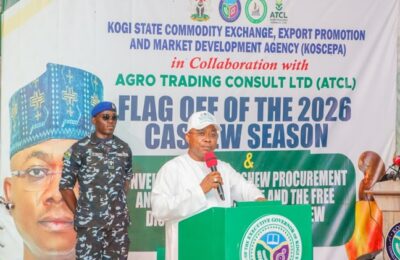Cashew dealers in Kogi state have urged the state government to intervene and stop foreigners from disrupting the cashew value chain, citing exploitation and poverty as major concerns.
The dealers, who begged government to take action to prevent foreigners from exploiting local farmers, lamented that they have been facing this problem for over 30 years, with foreigners, especially Indians, bypassing local merchants and buying directly from farmers.
They argued that this disrupts the normal value chain, hurting local merchants and reducing farmers’ income, which contributes to poverty and insecurity
The BOT Chairman of the Kogi Cashew Dealers Stakeholders Association, Baba Mohammed explained that the foreigners’ actions are reducing local farmers to extreme poverty, as their goal is to export the product without adding value to the local economy.
Mohammed explained that the value chain in the cashew industry involves farmers, buyers, Licensed Buying Agents, merchants, exporters, and processors.
He, however, said foreigners are disrupting this chain by buying directly from farmers, which hurts local merchants and reduces farmers’ income.
Mohammed lamented that the locals are being pushed out of the process, and their livelihoods are being threatened.
He revealed that the Kogi State Assembly has fast-tracked a motion to address the issue, directing the Ministry of Agriculture to intervene.
He stated that the farmers are seeking the government’s intervention to protect their livelihoods and ensure that the cashew industry benefits the local people.
Mohammed expressed hope that the government will take action to address the issue and prevent foreigners from exploiting local farmers.
The BOT chairman stressed that the association is not against foreigners investing in the cashew industry, but they want them to follow the proper value chain and not bypass local merchants.
He noted that foreigners should add value to the local economy and not just export raw materials.
Mohammed emphasised that the government needs to enforce policies that protect local farmers and ensure that the industry benefits the local economy.
“The appeal we want to make is clear. We are asking the state government to intervene and stop foreigners from distorting, corrupting, and interfering with the cashew value chain.
“The reason this is important is that these foreigners’ actions will reduce local farmers to extreme poverty. Their goal seems to be simply to come here and export a product that’s already ready for export. We’ve been doing this for over 30 years, and during our first meeting in Lagos, this issue of foreign interference was at the heart of our discussions. We’ve been facing these problems for much longer than people realise.
“These foreigners don’t have any right to vote, but they’re here trying to take over our economy. If they succeed, we risk falling into a new form of colonization. We’re asking both the federal and state governments to step in and help us.
“We urge the government to ensure that everyone follows the rules, particularly foreign owners and exporters. They should stick to their role in exporting goods, while local businesses focus on the retail and aggregation aspects.”
Adamu called on the government to take action to prevent foreigners from overstepping their boundaries and taking control of critical aspects of the local economy that should remain in the hands of Nigerian citizens.
“I appeal to the government to prevent foreigners from usurping the rights and functions of the citizens. Their activities should be limited to certain areas, like the media towns, and they should only be involved in buying dried cashew,” Adamu continued. “Buying wet cashew is not in line with global practices and represents an aberration in our local commercial practices. This misuse of our hospitality to eliminate us from the value chain must not continue.”
Furthermore, Mr. Adamu expressed concern over the gradual shift in the country’s economic landscape. “The citizens of the country are gradually becoming more involved in the country’s business. If this trend continues, it will lead to many problems down the line,” he warned.
The chairman’s statements reflect growing fears that the increasing participation of foreign businesses could undermine local industries and lead to a loss of control over vital sectors of the economy. Local business owners and stakeholders are calling on the government to enforce stricter regulations to protect the interests of Nigerian citizens and preserve the integrity of local industries.




